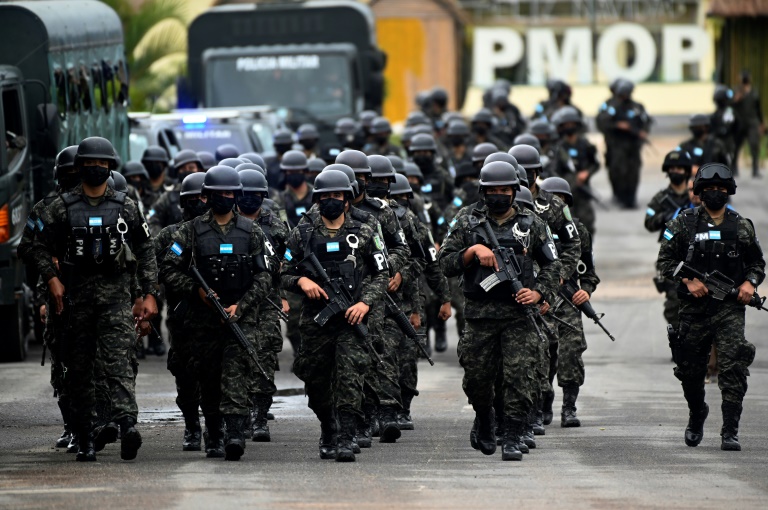Honduras beefs up borders in crackdown on gangs

Honduran military police in Tegucigalpa
Tegucigalpa – Honduras on Sunday sent more than 600 military police officers to its borders with El Salvador, Guatemala and Nicaragua as part of a state of emergency declared against criminal gangs in the Central American nation, police told AFP.
The small country has long been plagued by poverty, gangs and violence linked to drug trafficking. Gangs have recently been extorting ordinary citizens as they go about their business, and President Xiomara Castro declared the emergency on Thursday.
“Under the order issued by the President of the Republic and within the framework of the Global Security Plan, more than 600 military police left today to reinforce security operations at the border points,” military police spokesman Mario Rivera said.
The reinforcements aim to “prevent the entry” into the country of “members of criminal structures” from neighboring countries, and in particular from El Salvador, the spokesman said.
In that country, President Nayib Bukele has led a “war” against gangs this year, with 58,000 people detained so far.
The reinforcements in Honduras were sent to the departments of Choluteca, Valle (south), La Paz, Intibuca, Ocotepeque (west), Santa Barbara, Cortes (northwest), El Paraiso and Gracias a Dios (east), according to Rivera, who said they would remain in place “indefinitely.”
Castro’s state of emergency is aimed at reinforcing a government strategy “of immediate recovery of lawless territories.”
Elected the country’s first woman president in January, Castro declared “war on extortion, just as we declared war on corruption, impunity and drug trafficking.”
Along with neighbors El Salvador and Guatemala, Honduras forms the so-called “triangle of death” plagued by the murderous gangs called “maras” that control drug trafficking and organized crime.
In 2020, there were 37.6 recorded homicides per 100,000 inhabitants.
High poverty and unemployment, along with gang and drug violence, compel nearly 800 Hondurans to leave the country every day, headed mainly for the United States, where more than a million already live, most of them undocumented.
